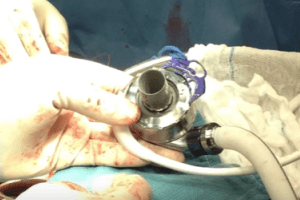
Replacing the device might be riskier than leaving it in. A new study suggests that for some patients with implanted heart defibrillators that have been recalled by the manufacturer, replacing the device might be riskier than leaving it in. Canadian researchers found a much higher than expected rate of surgical complications in people who had their […]

Replacing the device might be riskier than leaving it in. A new study suggests that for some patients with implanted heart defibrillators that have been recalled by the manufacturer, replacing the device might be riskier than leaving it in.
Canadian researchers found a much higher than expected rate of surgical complications in people who had their potentially faulty defibrillators replaced.
As a result, some patients “might want to hang out and wait and see what happens,” said study co-author Dr. Andrew Krahn of the London Health Sciences Center in Ontario.
Six percent of the 533 patients who decided to have their recalled defibrillators replaced over a 12-month period suffered major complications, including two deaths, the study found.
In contrast, the risk of failure among recently recalled defibrillators has been estimated by the manufacturers at just 0.009 percent to 2.6 percent. And not every failure is deadly.
The study, published in Wednesday’s Journal of the American Medical Association, provides the first estimate of the risk of major complications from replacement surgery. That is important information for patients and doctors faced with the decision of whether to leave a possibly defective device in the body or replace it.
Implantable defibrillators can be as small as a half dollar and are placed surgically under the skin of the upper chest. Vice President Dick Cheney is among the thousands of Americans who have one.
When the device senses a dangerous and potentially deadly irregular heartbeat, it sends electrical impulses to jolt the heart back to normal. It can correct a heart that beats too fast, as in ventricular tachycardia, or quivers chaotically, a condition known as ventricular fibrillation.
A total of 270,000 defibrillators have been recalled since January 2005, though it is unclear how many were inside patients and how many were on the shelf, according to the Food and Drug Administration. About 80,000 patients received the implantable devices in 2004.
Krahn said the rate of complications from surgical removal will surprise doctors, because replacing a defibrillator is considered a minor procedure.
“It’s typically performed with a local anesthetic and sedation. It takes an hour or less,” he said. “Most patients return home the same day.”
The researchers studied 2,915 patients who were tracked by 17 Canadian hospitals in 2004-05. All the patients had devices that were recalled by manufacturers, Canada’s national health system or the FDA.
Only 18 percent decided to undergo replacement surgery. Infection, bruising or bleeding required a follow-up operation in 31 of those patients. Two patients died.
“That risk is much higher than we initially thought,” Krahn said.
The researchers did not follow the people who decided against replacement to see whether anything actually went wrong with their defibrillators.
The findings are applicable to the U.S. because American medical practices are similar to those in Canada, Krahn said.
“We probably should leave more of these alone if they appear to be functioning normally,” said Dr. Anne Curtis, president of the Heart Rhythm Society, a nonprofit group of heart specialists, and chief of cardiology at the University of South Florida. Curtis was not involved in the study.
The Heart Rhythm Society plans to release draft recommendations Wednesday on pacemakers and implantable defibrillators. The draft will include guidelines to help doctors respond to recalls, Curtis said.
Implantable defibrillators, which cost between $30,000 and $40,000, contain batteries, insulated wires, memory chips, magnetic switches and other parts that can go awry. But some flaws are worse than others.
While some people might die because the device doesn’t deliver the necessary shock, other devices might have a flaw that merely causes the battery to run down early, something that can be caught during routine monitoring.
And some people who have defibrillators don’t need them as much as other patients do. Some patients are implanted with the devices as a preventive measure and have never actually suffered from fibrillation.
Doctors and patients often decide to leave a potentially faulty device in place after weighing the details of the recall and the patient’s health. Krahn said some patients may decide they cannot risk a device failure, and may go ahead with replacement surgery.
Dr. Dan Schultz, director of the FDA’s Center for Devices and Radiological Health, praised the study.
“This will allow the agency, as well as manufacturers and professional societies, to develop guidelines based on actual evidence, and to provide better advice to patients and doctors in the future,” Schultz said.
After a recall, manufacturers provide free replacements. But insurance companies must pay for the surgery, which can cost thousands of dollars.
Krahn reported that he has financial ties to two device makers, Medtronic and Guidant. But he said that the study was conducted without funding or influence from industry, and that his consulting work does not involve the defibrillators.
The personal injury attorneys at Parker Waichman offer free, no-obligation case evaluations. For more information, fill out our online form or call 1-800-YOURLAWYER (1-800-968-7529).


